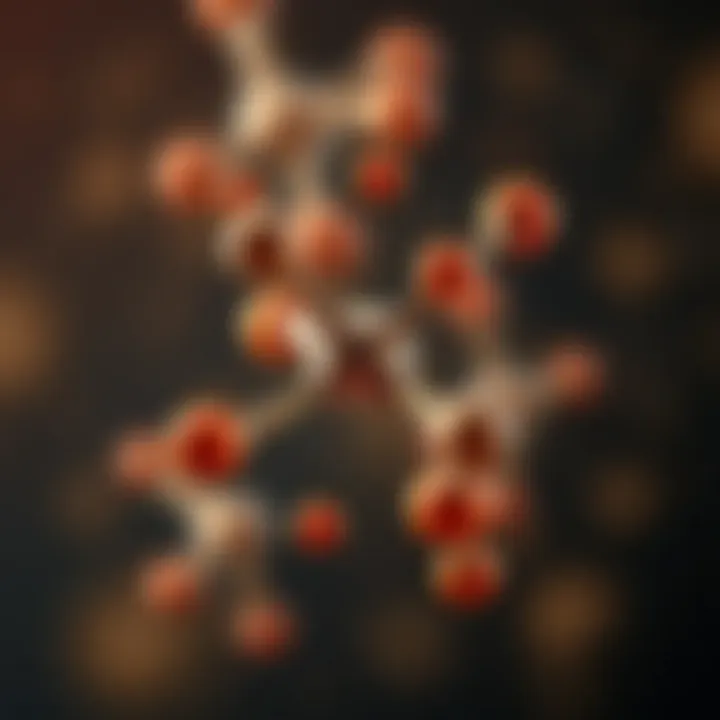Caffeine and Its Complex Impact on Heart Health


Intro
Caffeine appears in our everyday lives as a staple in our morning routines—not just a wake-up call but also a topic ripe for scientific inquiry. The relationship between caffeine and heart health has garnered significant interest over the years, with research revealing contrasting views on its role. Many people consume caffeine-laden drinks, like coffee or energy beverages, without a second thought. However, what does it mean for our heart health, both in the short term and long term?
Understanding this relationship is crucial for individuals who may be at risk for cardiovascular disease or simply want to make informed choices about their dietary habits. The proliferation of studies on this subject has shown how multifaceted this relationship becomes when we peel back the layers.
Some studies suggest that moderate caffeine consumption might even yield certain benefits, such as improved metabolic health and reduced risk of specific heart conditions. Conversely, the potential side effects—like increased heart rate or elevated blood pressure—raise eyebrows among health experts.
This exploration will navigate through these complexities, aiming to separate fact from fiction. With a growing body of evidence, the question persists: Is caffeine friend or foe when it comes to heart health? By delving deeper, we can uncover the nuances behind caffeine consumption and its implications for cardiovascular health.
Preface to Caffeine
Understanding caffeine is crucial for our growing knowledge about heart health and wellness. Caffeine, as a stimulant, is widely consumed around the world, often in beverages like coffee, tea, and energy drinks. Its effects on the body, particularly the cardiovascular system, have sparked much debate in both scientific and public circles. This section will delve into what caffeine is, its various sources, and why it matters to anyone concerned about heart health.
Defining Caffeine
Caffeine is a natural alkaloid predominantly found in coffee beans, tea leaves, and cacao pods. Its chemical composition is defined as 1,3,7-trimethylxanthine, a compound that acts primarily as a central nervous system stimulant. When ingested, caffeine allows for heightened alertness and reduced fatigue, which is often why people turn to it during morning routines or long work shifts. While it can invigorate, caffeine also has noteworthy implications for cardiovascular health, either positively or negatively influencing heart function.
Sources of Caffeine
When pondering where caffeine comes from, our minds typically drift to a warm cup of coffee. However, the reality is much broader. Here are some common sources of caffeine that populate our diets:
- Coffee: The most popular source, with an average cup containing about 95 mg of caffeine.
- Tea: Depending on the type, brewed tea can contain anywhere from 20 mg to 70 mg per cup, with green tea, in particular, praised for its antioxidants.
- Energy Drinks: These beverages often tout caffeine levels far exceeding that of coffee, sometimes reaching upwards of 300 mg in a single can.
- Sodas: Soft drinks, especially colas, contain caffeine too, usually around 30 mg per 12 oz serving.
- Chocolate: While not normally a go-to source, dark chocolate has significant caffeine content that can affect heart health, especially in larger quantities.
Understanding these sources helps individuals make informed choices about their caffeine intake, which is integral when navigating concerns over heart health.
Physiological Effects of Caffeine
The physiological effects of caffeine deserve careful consideration in any discussion of its relationship with heart health. Caffeine, while often linked with alertness and energy, carries a more complex array of impacts on the cardiovascular system. Understanding these effects is essential, as they form the backdrop against which we evaluate caffeine’s potential benefits and risks.
Caffeine operates primarily as a stimulant. Once consumed, it quickly enters the bloodstream, exhibiting a host of effects that can vary greatly depending on individual characteristics such as genetic makeup, habitual consumption, and overall health status. This means that the physiological response can be as diverse as the many hats people wear.
Mechanism of Action on the Cardiovascular System
At a basic level, caffeine acts by blocking adenosine receptors in the brain. Adenosine is responsible for promoting sleep and relaxation; blocking its action leads to increased neuronal firing and the release of neurotransmitters like dopamine and norepinephrine. This cascade can result in heightened alertness, but it also extends to the heart.
Caffeine contributes to increased heart contractility and ventricular function. It can stimulate the release of calcium, enhancing the strength of cardiac contractions. Consequently, this means your heart can pump more efficiently under conditions where it might otherwise struggle. However, there lies a caveat; for people with pre-existing heart conditions, overstimulation can push cardiac function beyond safe limits, leading to complications. In short, caffeine can boost cardiac output—but at what cost?
Impact on Heart Rate and Rhythm
Caffeine's effects on heart rate and rhythm are pivotal in understanding its overall impact on cardiovascular health. For many, caffeine consumption leads to a rise in heart rate, a condition known as tachycardia. This increase may be viewed favorably for those looking to lift their energy levels; however, tachycardia can pose risks, particularly for vulnerable individuals.


Some studies suggest that caffeine can lead to an irregular rhythm, particularly in those predisposed to arrhythmias. The connection between caffeine and atrial fibrillation has sparked significant interest. Research indicates that while moderate caffeine intake may not increase the risk of this condition, excessive consumption could potentially act as a trigger.
When considering these effects, it helps to keep in mind not just the amount of caffeine consumed, but also the individual’s overall health profile.
"Understanding caffeine requires a nuanced perspective on not only its biochemical mechanisms but also the variances in human physiology."
Caffeine and Cardiovascular Risk Factors
Understanding the relationship between caffeine and cardiovascular risk factors is vital for both health professionals and everyday individuals. Caffeine is not just a morning ritual; it has the potential to influence key aspects of cardiovascular health. This section dives into how caffeine consumption relates to hypertension, cholesterol levels, and weight management, all of which are crucial components of heart health. By examining these factors, we can grasp how caffeine acts within the body and consider its implications for those at higher risk for cardiovascular issues.
Hypertension and Caffeine Consumption
Hypertension, or high blood pressure, is a significant risk factor for heart disease. Many studies have scrutinized the connection between caffeine intake and blood pressure levels, leading to a mixed bag of findings. Some individuals experience a temporary spike in blood pressure soon after consuming caffeine, which can be concerning, especially for those already at risk.
Research suggests that the effect of caffeine on blood pressure may vary widely from person to person. Genetic predispositions, tolerance levels, and even habitual caffeine consumption play critical roles. For instance, some people metabolize caffeine quickly, reducing its impact on blood pressure, while others might find themselves more sensitive.
Caffeine and Heart Disease
Caffeine's link with heart health is a multi-faceted issue that requires careful scrutiny given the growing prevalence of heart disease globally. Heart disease holds a significant place as one of the leading causes of death, prompting researchers to investigate all potential factors impacting cardiovascular well-being. Caffeine, consumed primarily through coffee, tea, and various energy drinks, presents itself both as a stimulating agent and potential health risk. Understanding the correlation between caffeine intake and specific heart conditions can aid in shaping dietary recommendations and busting myths surrounding its consumption. This section aims to peel back the layers of this relationship, examining how caffeine might contribute to or help mitigate risks associated with heart disease.
Research Findings: Causal or Correlational?
The debate surrounding caffeine’s influence on heart disease often boils down to whether its effects are causal or merely correlational. Some studies suggest that higher caffeine intake correlates with a lower incidence of certain heart conditions, implying a protective effect. On the other hand, other research highlights an increased risk for arrhythmias in those with excessive consumption.
Identifying the nature of these relationships is not as straightforward as it might seem. Lifestyle factors, genetic predispositions, and even the presence of other variables complicate the picture.
- Positive correlations: Some population studies indicate that moderate caffeine consumption could offer protective benefits against conditions like coronary artery disease.
- Negative correlations: Conversely, there is evidence that high caffeine intake might increase blood pressure or heart rhythm irregularities in susceptible individuals.
Understanding whether the relationship is causal elucidates whether dietary recommendations should advocate for or discourage caffeine consumption for heart patients.
Analyzing Specific Types of Heart Disease
Coronary Artery Disease
Coronary artery disease (CAD) is characterized by the narrowing of coronary arteries due to plaque buildup, leading to reduced blood flow to the heart. This type of heart disease is crucial to examine when discussing caffeine's impact, as many people consume it regularly without fully understanding the potential implications.
The key characteristic of CAD is its progressive nature, which can be exacerbated by risk factors like hypertension and high cholesterol levels. It is beneficial to include CAD in this article as it serves as a clear example of how lifestyle factors, including caffeine intake, can directly influence heart health.
One unique feature of CAD is its widespread prevalence, making it a pertinent concern for many. Researchers have found that moderate caffeine consumption may offer some protective effects, but the key lies in moderation. For those already at risk, excessive caffeine might counteract potential benefits, posing a dilemma for health professionals.
Atrial Fibrillation
Atrial fibrillation (AF) represents a type of irregular heartbeat that can lead to serious complications, including stroke and heart failure. Recognizing AF’s connection to caffeine is vital as studies show mixed results on whether caffeine might trigger episodes of arrhythmia.


A defining characteristic of AF is its unpredictability, which adds complexity to how caffeine might be involved. Given that some individuals are particularly sensitive to the stimulating effects of caffeine, understanding its potential to exacerbate AF is crucial. This topic garners attention because it highlights the need for tailored recommendations for those with heart rhythm disorders.
On the flip side, some evidence suggests that moderate caffeine intake does not increase the risk of AF in the general population. Hence, it opens doors to ongoing debate about what constitutes safe consumption levels for individuals experiencing this condition.
Heart Failure
Heart failure is a condition where the heart cannot pump sufficient blood to meet the body’s needs. Analyzing its relationship with caffeine provides insights into how caffeine could impact those already suffering from compromised heart function.
The unique feature of heart failure is its multi-faceted nature, influenced by numerous factors such as lifestyle choices and existing medical conditions. Caffeine’s role can be viewed through various lenses. Some studies indicate potential risks associated with high intake, while others show no negative correlation or even suggested benefits.
Highlighting heart failure is pertinent because individuals might have to navigate their caffeine choices carefully. Medical professionals often advocate for moderation, stressing that patients should discuss caffeine consumption within the context of their entire healthcare plan. Real-world advice emphasizes understanding one’s health status vis-à-vis caffeine intake since inappropriate levels could worsen symptoms or lead to hospitalizations.
Differential Responses to Caffeine
Caffeine affects individuals in different ways, with factors such as genetics, age, and gender playing significant roles in how the body metabolizes this stimulant. Recognizing these differential responses is crucial for understanding the broader implications of caffeine on heart health. These variations underscore that a one-size-fits-all approach to caffeine consumption may not be applicable. Some people may experience heightened benefits, while others might face risks, particularly when it comes to cardiovascular outcomes.
Genetic Factors Influencing Metabolism
Genetics can significantly impact how caffeine is processed within our bodies. The primary enzyme responsible for caffeine metabolism is cytochrome P450 1A2, with variations in the gene coding for this enzyme contributing to differences in metabolic rates among individuals. For instance, those with certain genetic variants may break down caffeine rapidly, leading to a lower likelihood of experiencing adverse effects like increased heart rate or elevated blood pressure.
Conversely, individuals with slower metabolizing variants may find themselves more vulnerable to these effects.
"The interplay between genetic make-up and caffeine metabolism highlights personalized medicine's potential, allowing tailored recommendations to optimize heart health."
However, it's not just the genetic variants that matter; environmental factors and habitual caffeine intake also tend to affect how these genes are expressed. As such, understanding one's genetic predisposition could aid in making more informed decisions related to caffeine consumption and its potential cardiovascular impacts.
Age and Gender Variations
Caffeine's effects also appear to differ by age and gender, which warrant consideration in any discussion on coffee, tea, or energy drink consumption and heart health.
- Age: As individuals age, their metabolic rates tend to slow down, potentially affecting how caffeine is processed. Older adults may experience heightened sensitivity to caffeine’s effects, such as increased heart rate or anxiety, compared to younger individuals. This increased sensitivity might necessitate adjustments in caffeine consumption to mitigate potential heart-related issues.
- Gender: Research indicates that men and women may respond differently to caffeine. Women, especially those taking birth control or who are pregnant, often metabolize caffeine more slowly due to hormonal influences. This slower pace could heighten the risk for heart problems associated with excessive caffeine intake. Additionally, men might tend to consume more caffeine on average, leading to different patterns of cardiovascular risk.
In summary, recognizing the roles of genetics, age, and gender can provide insights into how caffeine affects heart health, thus serving as a foundation for personalizing dietary recommendations. As with many health considerations, what works for one person may be counterproductive for another.
Guidelines for Safe Consumption
The discussion around caffeine often reflects a complex relationship between benefits and potential risks, particularly when it comes to heart health. Therefore, establishing guidelines for safe consumption is not just prudent—it’s essential. Knowing how much caffeine is appropriate can help individuals strike a balance between enjoying their favorite caffeinated beverages and minimizing potential adverse effects on cardiovascular health.
Understanding these guidelines can also empower patients and health professionals alike, ensuring that choices made regarding caffeine consumption are backed by solid evidence, rather than mere trends or hearsay. This section will dissect the current recommendations and delve into special considerations for sensitive individuals.
Current Recommendations from Health Authorities


Current guidelines from health authorities typically suggest that moderate caffeine consumption can be part of a healthy diet for most individuals. The general consensus among organizations like the U.S. Food and Drug Administration (FDA) and the American Heart Association (AHA) states that:
- A daily intake of up to 400 mg of caffeine, roughly equivalent to four 8-ounce cups of brewed coffee, is deemed safe for most adults.
- Pregnant women, however, are advised to limit their caffeine intake to about 200 mg per day, as elevated caffeine levels can influence fetal heart rate and development.
- Individuals with pre-existing heart conditions should consult healthcare providers for tailored recommendations.
In practical terms, these guidelines emphasize the importance of moderation. Caffeine in moderation has been linked to several health benefits, such as enhanced focus and improved metabolism, yet it's crucial to recognize that sensitivity to caffeine varies from person to person. Thus, while some can handle more without issue, others might experience jitteriness or increased heart rate at lower doses.
Cautions for Sensitive Individuals
Certain segments of the population may find themselves more reactive to caffeine than others. For instance, those with existing heart conditions or hypertension should approach caffeine consumption with extra caution. Here are some key considerations:
- Personal Sensitivity: Signs like rapid heartbeat, anxiety, or sleep disturbances after caffeine consumption can indicate sensitivity. Individuals experiencing these symptoms may need to reduce their intake.
- Medication Interactions: Caffeine can interact with certain medications, particularly those affecting heart function, necessitating guidance from a healthcare provider.
- Age and Metabolism: Older adults may metabolize caffeine more slowly, leading to prolonged effects that could disrupt their heart rhythm or quality of sleep. In such cases, lowering intake is advisable.
"Moderation is key; always listen to your body and consult your doctor if in doubt about caffeine's impact on your heart."
For further details, consider exploring resources from the National Institutes of Health (NIH) here and the Mayo Clinic here.
Ending and Future Research Directions
In summarizing the intricate relationship between caffeine and heart health, it's pivotal to recognize the nuanced balance between potential benefits and risks associated with its consumption. This section aims to encapsulate what we have gleaned thus far while also shining a light on future avenues for research. The ongoing scrutiny of caffeine's effects on the cardiovascular system is not merely an academic exercise; it is essential for understanding how to guide individuals in their daily lives as they navigate their dietary choices.
Summary of Findings
Caffeine, often celebrated for its invigorating effects, reveals a layered connection with heart health through various research studies. Evidence indicates that moderate caffeine consumption could be associated with lower risks of certain heart conditions such as heart disease, while excess intake might lead to complications like hypertension or arrhythmias. Importantly, the individual variability in caffeine metabolism—driven by genetic, age-related, and gender-specific factors—adds another layer to the discourse.
Key takeaways include:
- Moderate caffeine intake may benefit cardiovascular health but excessive consumption can pose risks.
- Individual responses to caffeine vary widely across the population.
- The implications of caffeine on heart health extend beyond mere caffeine dosage, factoring in lifestyle, genetics, and pre-existing conditions.
Implications for Clinical Practice
The spectrum of findings emphasizes the necessity for clinicians to take a tailored approach when advising patients on caffeine consumption. It fosters a dialogue that weighs individual characteristics against generalized dietary guidelines. This is particularly significant for those with preexisting conditions or heightened sensitivity to caffeine. Clinical implications include:
- Assessing caffeine intake as part of a comprehensive cardiovascular evaluation.
- Educating patients on the nuances of caffeine's effects, particularly in relation to their unique health profiles.
- Advocating for moderation rather than blanket avoidance, which could lead to unnecessary deprivation of a widely consumed and enjoyed substance.
Research Gaps and Opportunities
Despite the wealth of existing literature, there remains significant ground for further exploration in this field. Emerging questions need addressing to enhance our understanding and provide more specific guidance—questions such as:
- How do various brewing methods and preparations affect caffeine levels and subsequent health outcomes?
- What are the long-term implications of habitual caffeine consumption among diverse populations?
- Are there synergies between caffeine intake and other lifestyle factors, like diet and exercise, that could amplify or diminish health effects?
By addressing these gaps, researchers can pave the way for more informed decisions that benefit public health, aligning dietary guidelines with the latest scientific understanding.
Ultimately, the exploration of caffeine’s relationship with cardiovascular health is akin to navigating a complex maze—full of twists and turns that require deliberate, informed approaches to arrive at beneficial outcomes for individuals.
In summary, while caffeine continues to stir debate within health circles, its multifaceted role in heart health is as clear as daylight. Future research endeavors will be vital for distilling the intricacies of this relationship into actionable insights.
Further Reading
- Caffeine and Heart Health - Mayo Clinic
- Caffeine Consumption and Cardiovascular Disease - American Heart Association
- Understanding Caffeine: A Guide - National Institutes of Health















